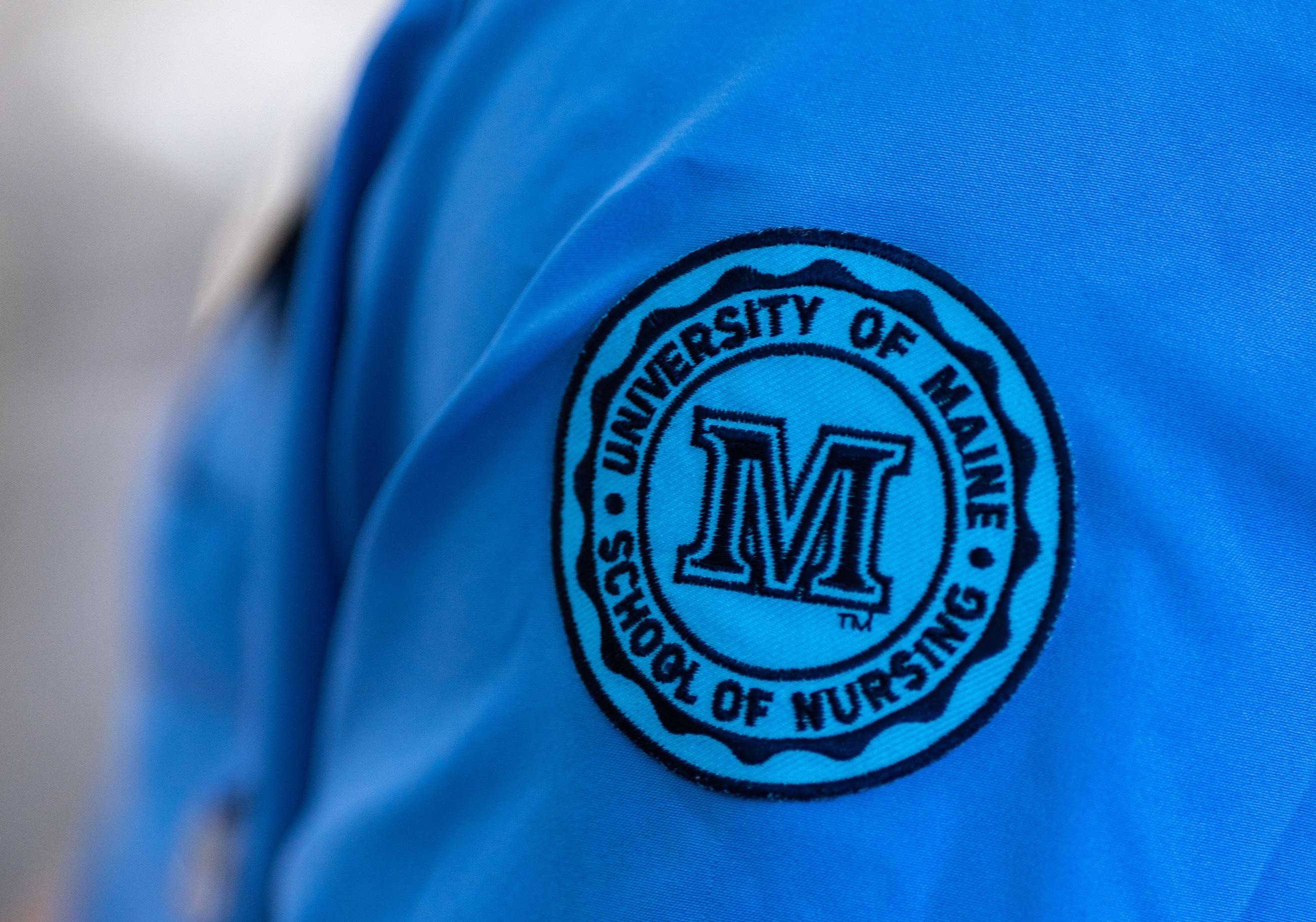

Mission, Vision and Values
MISSION
UMaine Mission
Through integrated teaching, research and outreach, the University of Maine improves the quality of life for people in Maine and around the world and promotes responsible stewardship of human, natural and financial resources.
School of Nursing Mission
In the School of Nursing (SON) we educate nurses for the future by advancing rigorous and effective academic programs, building infrastructure to engage faculty and students in nursing scholarship and strengthening reciprocal partnerships with our global, state, local and university communities in the pursuit of a diverse and resilient nursing workforce. We do this by:
• Leading excellence in nursing education and research by humanizing health care to prepare the nursing workforce through collaboration and partnership.
• Responding proactively to the needs of the nursing profession with grace and humility to educate the future of nursing.
VISION
UMaine Vision
Transform lives through research, teaching and public service.
SON Vision
Cultivate a courageous, inclusive community of professionals that lead excellence in education, research and public service.
VALUES
SON Values
The core of our values is courage. Creating a courageous culture fosters our other values of:
• Empathy and compassion
• Integrity and excellence
• Creativity and innovation
• Diversity, equity and inclusion
• Accountability
• Belonging and connection
Academic Programming
GOAL:
Educate nurses for the future by advancing rigorous and effective academic programs that align with standards set forth by accreditors and professional licensing boards and are informed by program evaluation data.
STRATEGIC PRIORITY (OBJECTIVE) KEY STRATEGIES/ACTIONS OUTCOME(S)
Align undergraduate and graduate curricula with standards set forth by accrediting and quality standards as applicable.
Map BSN and graduate curricula to the new AACN Essentials standards utilizing backwards design.
Transition to a competency-based curriculum for BSN and MSN programs through structured faculty collaboration.
Map MSN and MSN-FNP curricula to new AACN Essentials, NONPF Core Competencies, APRN Doctoral Competencies and Standards for Quality Nurse Practitioner Education.
Identify and address gaps in curriculum map.
Explore the feasibility and map a Doctorate of Nursing Practice (DNP) degree program with a Family Nurse Practitioner (FNP) track.
By spring 2023, faculty will vote to accept new leveled program outcomes for undergraduate programs mapped to new AACN Essentials.
By spring 2024, faculty will vote to accept new leveled program outcomes for graduate programs mapped to new AACN Essentials.
By fall 2025, all BSN and MSN courses (as documented in syllabi), simulation evaluation tools and clinical evaluation tools will be mapped to the new AACN Essentials and will be consistent with competency based education standards.
Ensure compliance in areas of accreditation deficiency by using feedback from the 2020 CCNE accreditation visit.
Ensure that program outcomes demonstrate program effectiveness at the graduate level.
Use program outcome data to improve program quality at the graduate level.
Ensure all full-time, part-time and adjunct faculty and clinical instructors are at a minimum MSN-prepared.
By fall 2025, all graduate faculty will have revised program evaluation measures and benchmarks to measure teaching effectiveness.
By fall 2024, all graduate faculty will adopt a process to annually use program evaluation data to make curriculum changes to improve program quality.
By spring 2025, all full-time, parttime and adjunct faculty and clinical instructors will either be enrolled in a masters and/or doctoral program in nursing, or completed a masters program in nursing.
STRATEGIC PRIORITY (OBJECTIVE) KEY STRATEGIES/ACTIONS OUTCOME(S)
Update program evaluation and quality improvement plan for undergraduate program.
Determine measures and benchmarks using Kirkpatrick’s model.
Identify individuals/committees responsible for tracking specific measures and implementing changes as needed.
Specifically address quality, safety and evidence-based practice competencies in clinical education.
Annually, faculty will adopt an updated program evaluation and quality improvement plan.
Annually, key program tracking individuals will be identified and program evaluation data will be tracked and filed in a central location.
Prepare for changes associated with NCLEX NextGen (NGN).
Update undergraduate curriculum to incorporate and prepare learners for new NGN-style evaluation questions.
Revise the Master of Science nurse educator curriculum to include content that will prepare undergraduate students for licensure examination success.
Provide faculty with continuing education and resources about NCLEX NGN.
Develop assessment and evaluation guidelines that support inclusivity and diverse learning styles.
By spring 2027, the NCLEX NGN pass rate will be at or exceed the national average.
By fall 2023, faculty will be scheduled for NCLEX NGN educational sessions and there will be a continually updated NCLEX NGN electronic repository with educational resources folder.
By fall 2023, testing guidelines that support inclusivity and diverse learning styles will be developed and available to faculty in the NCLEX NGN electronic repository with educational resources folder and followed.
Revise all courses with a nurse education focus to meet the needs of community partners and enhance program growth.
Identify curricular gaps informed by feedback from faculty, course evaluations, alumni and community partners.
Map the curriculum to the National League of Nursing Certified Nurse Educator competencies.
Design course content to address education in clinical, laboratory and didactic settings that is consistent with industry needs, accreditation standards and licensing requirements.
By fall 2025, nurse educator course learning objectives and content will be reflective of revisions.
By spring 2027, the MSN-nurse educator track will expand to include an additional 10 clinical partnerships.
By fall 2023, develop and implement an advanced level nursing education work group to address curricular needs in the MS-nurse educator track.
Public Service and Community Engagement
GOAL:
Strengthen internal programming and reciprocal partnerships with our global, state, local and university communities to develop and sustain a diverse and resilient nursing workforce.
STRATEGIC PRIORITY (OBJECTIVE) KEY STRATEGIES/ACTIONS OUTCOME(S)
Demonstrate a commitment to educating a resilient and diverse nursing workforce.
Adopt a diversity, equity and inclusion focused mission statement to guide the development of a culture of caring. Fully integrate holistic admissions protocol for pre-licensure and graduate programs.
Launch a peer-mentoring program for BSN students.
Support all new faculty regardless of rank with a formal mentoring program and assigned faculty mentor.
Recruit participants into the WellNurse research project and associated wellness interventions (e.g., MBSR courses, exercise classes, nutritional workshops, massages, Fitbit challenges).
Implement strategies to foster inclusive learning communities.
Support the growth of the first-year living-learning community for students housed on-campus.
Identify strategies to recruit diverse faculty.
Increase financial support for disadvantaged students.
Achieve a 55% 4-year graduation rate in BSN program.
Maintain 90% retention rate for MSN programs.
Achieve a 90% on-time (program specific) graduation rate for MSN program.
Retain an additional four part-time faculty members for >2 years.
STRATEGIC PRIORITY (OBJECTIVE) KEY STRATEGIES/ACTIONS OUTCOME(S)
Strengthen relationships with existing clinical agencies and partners in education.
Share SON activities with clinical agencies for awareness (e.g., marketing videos, Wellnurse activities and findings).
Explore shared positions between faculty and clinical agencies (i.e., EvidenceBased Research Program Coordinator).
Reconcile and identify opportunities for faculty and staff affiliations to capitalize on community resources for learning and practice.
By fall 2024, increased return rate of 40% on student evaluation of clinical sites and maintain mean of 4.0 or greater on the evaluation tool.
By fall 2024, faculty site visits will be documented in a standard repository for quality assurance.
SON nursing students will be designated as future essential personnel at agency sites and have their learning needs prioritized in states of emergencies. This will be included in clinical learning site contractional language.
Publish and highlight affiliations on public facing platforms and in marketing materials
Explore the feasibility of establishing a formal practice/academic partnership with local clinical sites.
Review literature and guidelines on the topic of partnerships including typical processes, costs and benefits.
Invite discussion on the topic from clinical leadership represented on the Advisory Board.
Identify one clinical agency to partner with for a pilot partnership working together to draft a proposal with roles and responsibilities of all parties.
Reestablish SON advisory board. Identify and invite key stakeholders to participate. Inclusive of community health agencies.
Collaboratively establish a charge to the advisory board.
Schedule standing meeting times and hybrid location.
Design and disseminate an employer satisfaction survey to inform curriculum.
Craft and reflect on a feasibility proposal.
Exchange insight from stakeholders about theory-practice gaps to develop a work-ready nursing workforce by identifying three priority areas for the SON to address.
SON advisory board will host two meetings annually by 2024.
STRATEGIC PRIORITY (OBJECTIVE) KEY STRATEGIES/ACTIONS OUTCOME(S)
Develop a standard operating procedure for SON disaster response and recovery when normal operations are disrupted for prolonged periods.
Revist lessons learned from the COVID-19 pandemic disruption to academic and clinical education operations.
Identify key areas for preparedness planning (e.g., communication, instruction, infrastructure, staff and student safety).
All SON students, staff and faculty will review and approve plan annually by 2025.
Include contractional language in clinical learning contracts that ensure ongoing student placement during states of emergency.
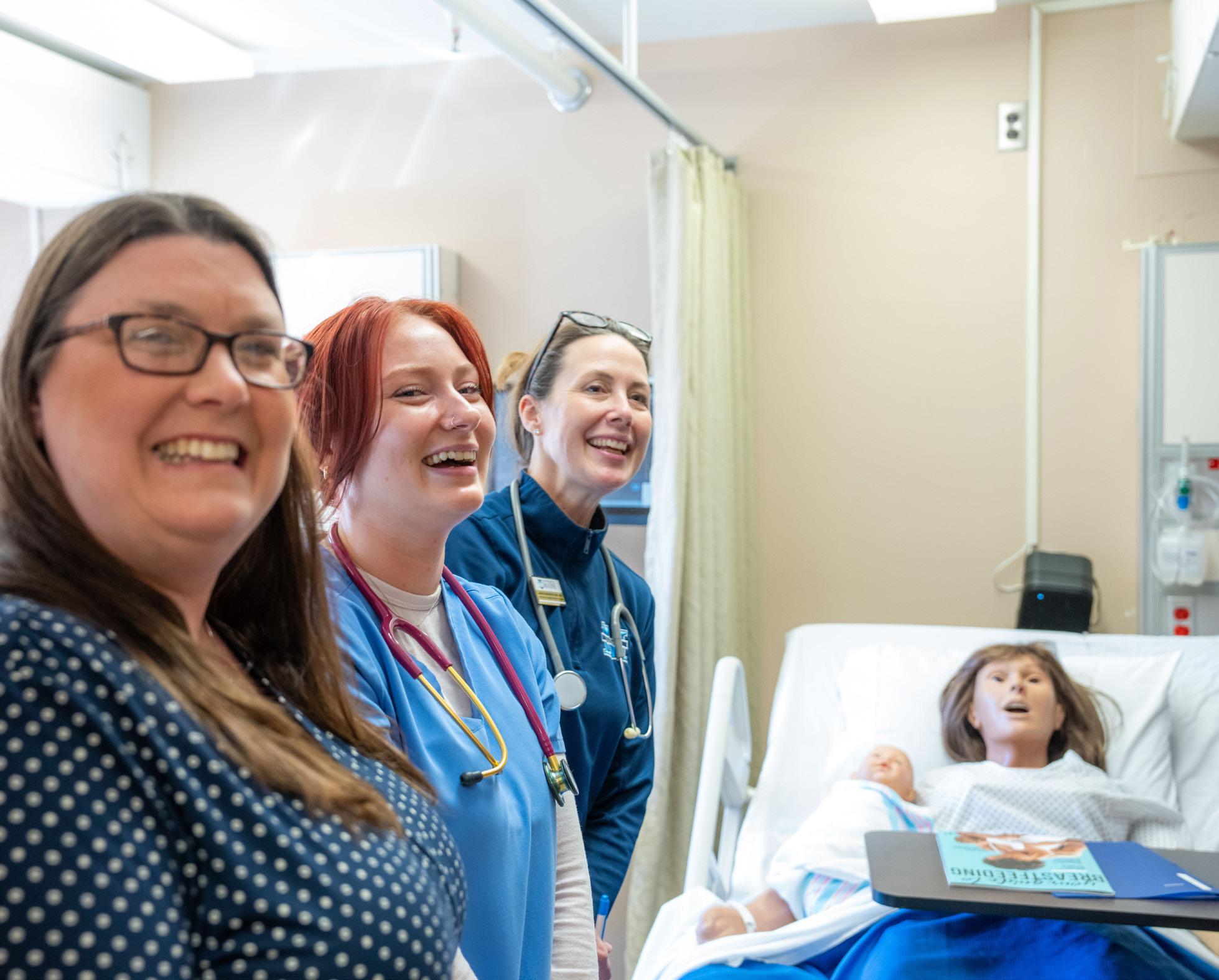
Be prepared to respond to public health needs as called on by community leadership.
Nominate SON personnel to serve on boards and committees that address public health needs.
Provide leadership in addressing public health issues as evidenced in faculty peer review service domain reports.
SON will participate in community health promotion activities (e.g., vaccine clinics, blood pressure screening) once per academic year.
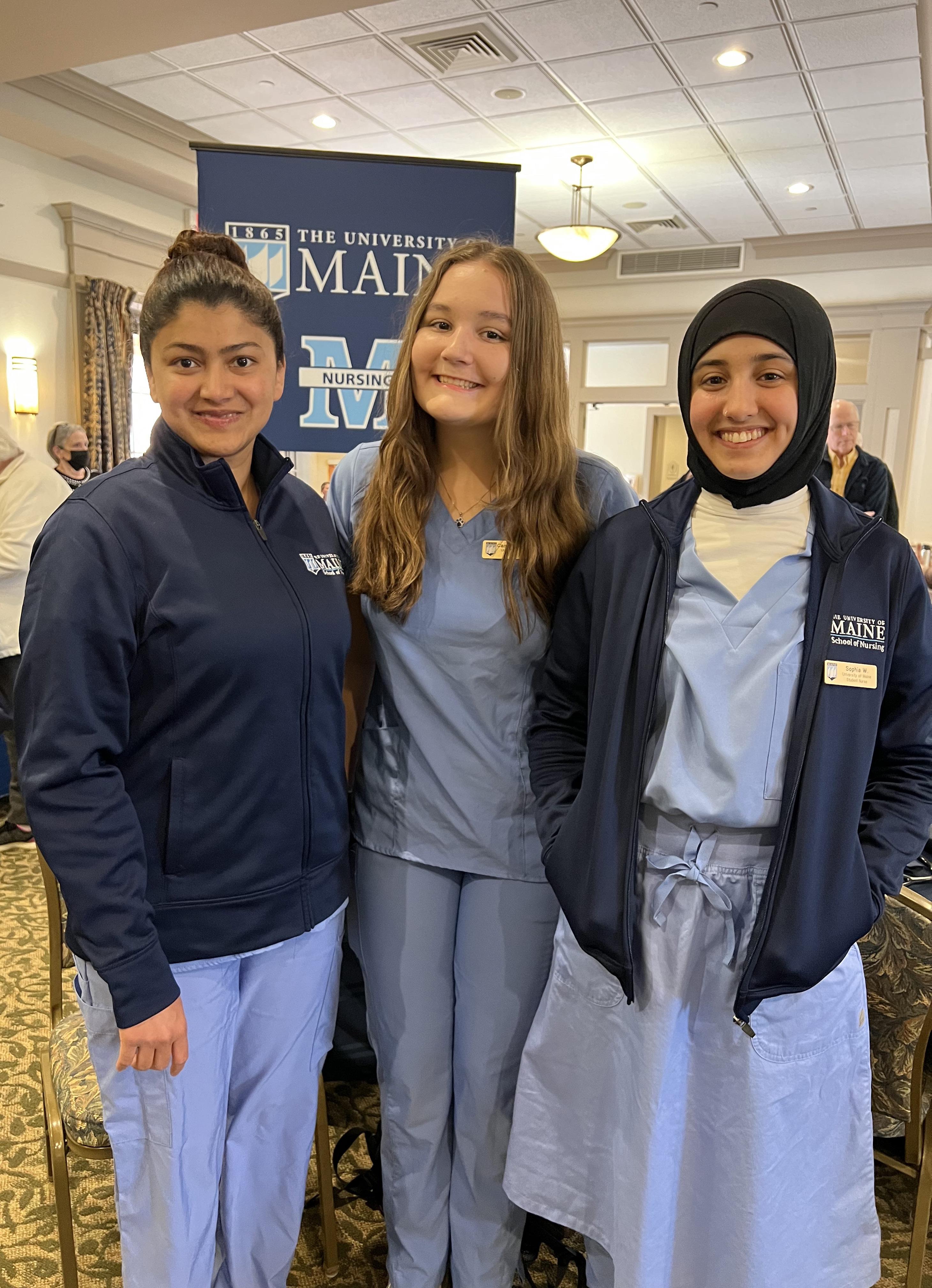
Research/Scholarship
GOAL:
Build infrastructure and promote transdisciplinary research/scholarship/translational science to engage undergraduate and graduate students in nursing research, evidence based and quality improvement projects and policy changes.
STRATEGIC PRIORITY (OBJECTIVE) KEY STRATEGIES/ACTIONS OUTCOME(S)
Establish standard operating procedures and programs to support professional growth of faculty.
Develop educational progression plans to ensure that all faculty have obtained the minimum master’s degree.
Develop faculty working knowledge and implementation of simulation based education
Extend continuing education opportunities/incentives for faculty
Formalize a new faculty mentoring group to promote ongoing professional development (e.g., train the trainer) in the areas of scholarship, teaching and service.
Develop onboarding process for doctoral faculty for mentorship.
Explore workload release opportunities and/or designate committee involvement.
By spring 2027, the University of Maine’s School of Nursing faculty will have a structured onboarding process that will include mentorship and formal classes.
Starting in spring 2023, all University of Maine’s School of Nursing faculty will attend one professionally relevant continuing education session (e.g., course, conference) per academic year.
Implement a new faculty mentoring group in collaboration with Office of Research Development to develop grant projects and mentorship for fall 2023.
Build infrastructure within the University of Maine’s School of Nursing to support interdisciplinary nursing research, evidence-based practice projects and scholarship.
Develop a Ph.D. program in nursing.
Establish formal interdisciplinary partnerships for research and evidence-based practice.
By 2027, the University of Maine’s School of Nursing develop a Ph.D. program in nursing with an emphasis on interdisciplinary research.
In the year 2027, The University of Maine’s School of Nursing will enroll its first cohort of Ph.D. students.
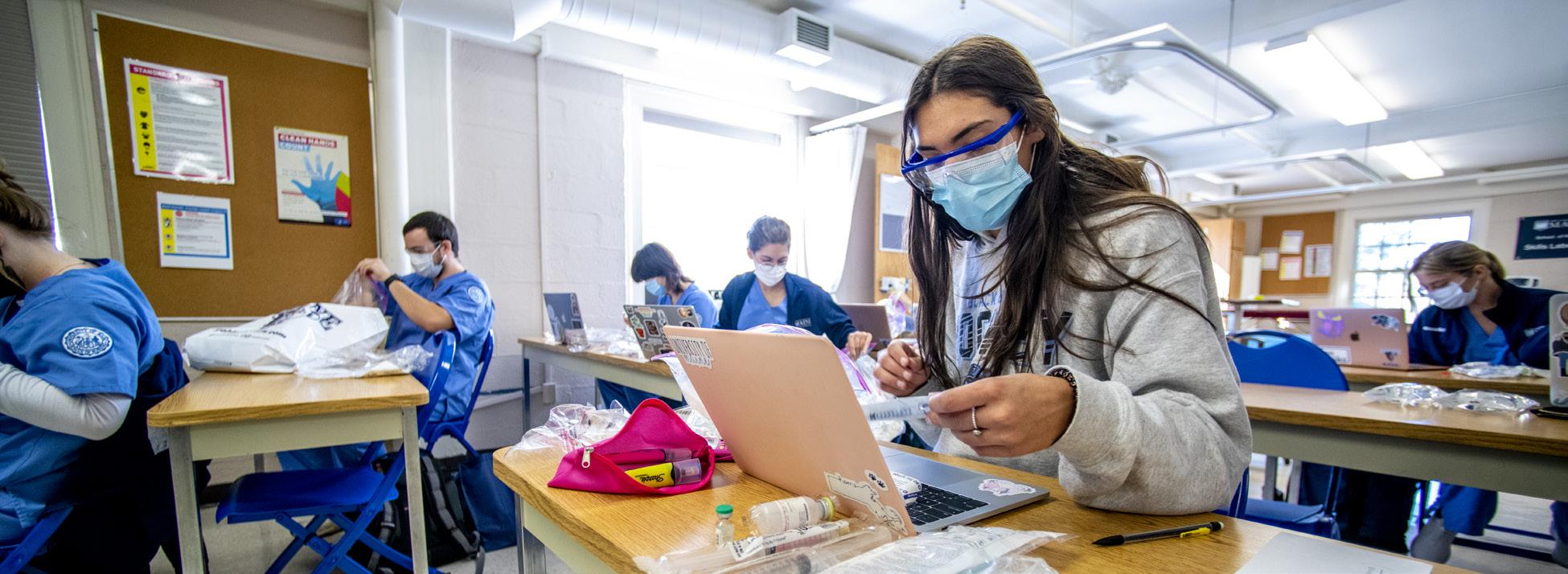
STRATEGIC PRIORITY (OBJECTIVE) KEY STRATEGIES/ACTIONS OUTCOME(S)
Engage undergraduate and graduate students from the School of Nursing and other disciplines to participate in research, evidence-based practice projects and scholarship in the School of Nursing.
Incorporate opportunities for all undergraduate graduate students to engage in research, evidencebased practice projects and quality Engage unde projects and scholarship opportunities with faculty in the University of Maine’s School of Nursing and University of Maine System (UMS) Schools of Nursing.
Collaborate with UMaine research and scholarship programs and initiatives (e.g. Research Learning Experience (RLE), Top Scholars etc) within the nursing programs.
By fall 2027, 10% of undergraduate students will be engaged in research, evidence-based practice projects, quality improvement projects and scholarship in addition to minimum curriculum expectations.
By fall 2027, 5% of masters graduate students will be engaged in research, evidence-based practice projects, quality improvement projects and scholarship to augment curriculum expectations.
Update program courses and associated activities to include structure for the generation, synthesis, translation and dissemination of nursing science.
Develop a capstone course or modules in the MSN program to guide learners through the capstone scholarship experience.
Collaborate with Honors College to develop a nursing pathway.
Reestablish and establish collaborative relationships with area research centers (e.g., Maine Medical Center Translation of Science Center, Eastern Maine Medical Center Evidence-Based Practice Center, etc.).
By May 2024, 100% graduate student thesis/capstones/research projects will be in Digital Commons.
Develop of a Honors College Nursing Pathway specifically highlighting student undergraduate nursing projects with designated nursing faculty by 2025
50% of graduates will present at either local, regional and/or national conferences.
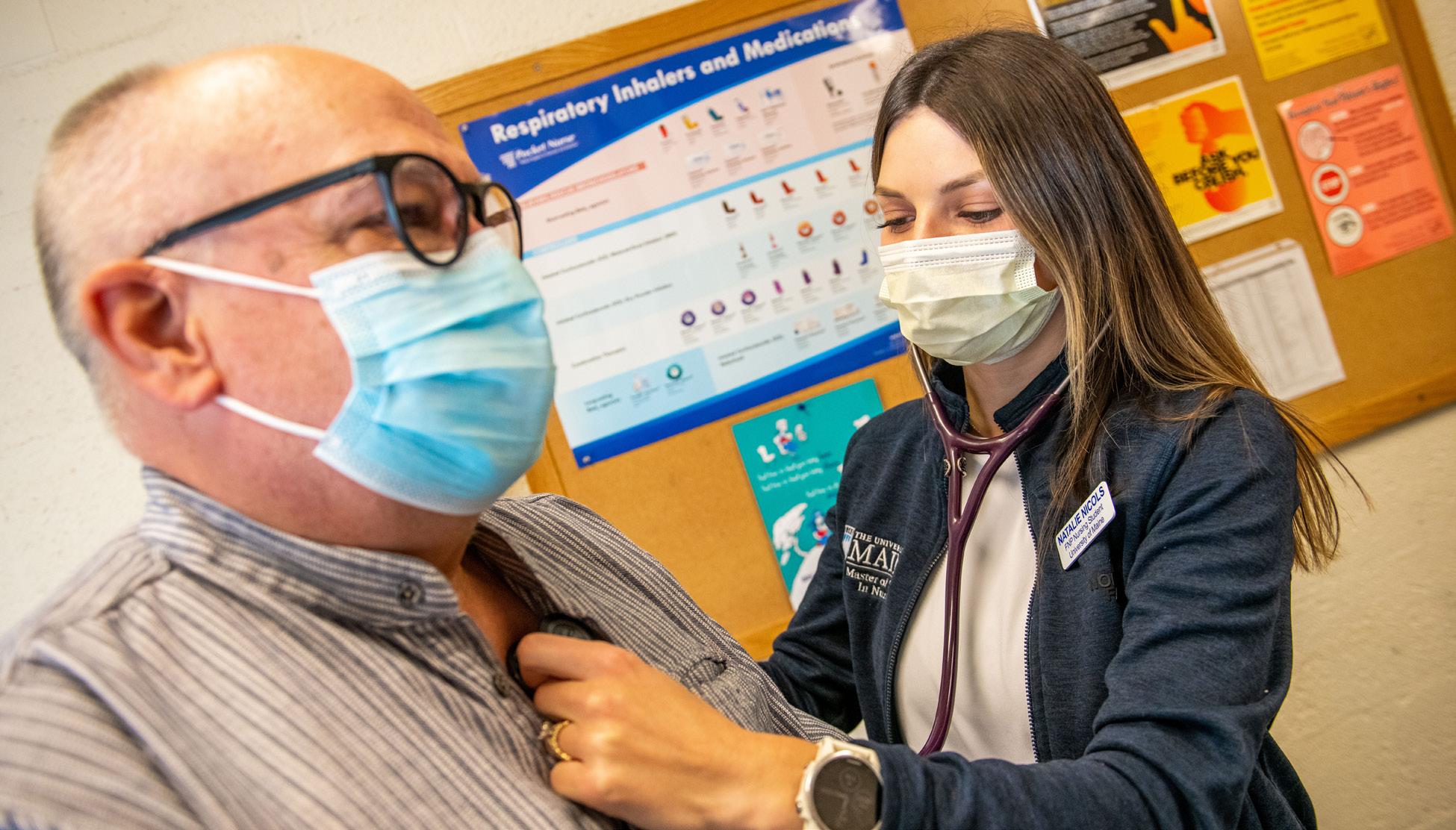
School of Nursing Strategic Plan 2023-27
In complying with the letter and spirit of applicable laws and pursuing its own goals of diversity, the University of Maine System does not discriminate on the grounds of race, color, religion, sex, sexual orientation, transgender status, gender, gender identity or expression, ethnicity, national origin, citizenship status, familial status, ancestry, age, disability physical or mental, genetic information, or veterans or military status in employment, education and all other programs and activities The University provides reasonable accommodations to qualified individuals with disabilities upon request. The following person has been designated to handle inquiries regarding nondiscrimination policies: Director of Equal Opportunity, 101 Boudreau Hall, University of Maine, Orono, ME 04469-5754, 207.581.1226,TTY 711 (Maine Relay System).

